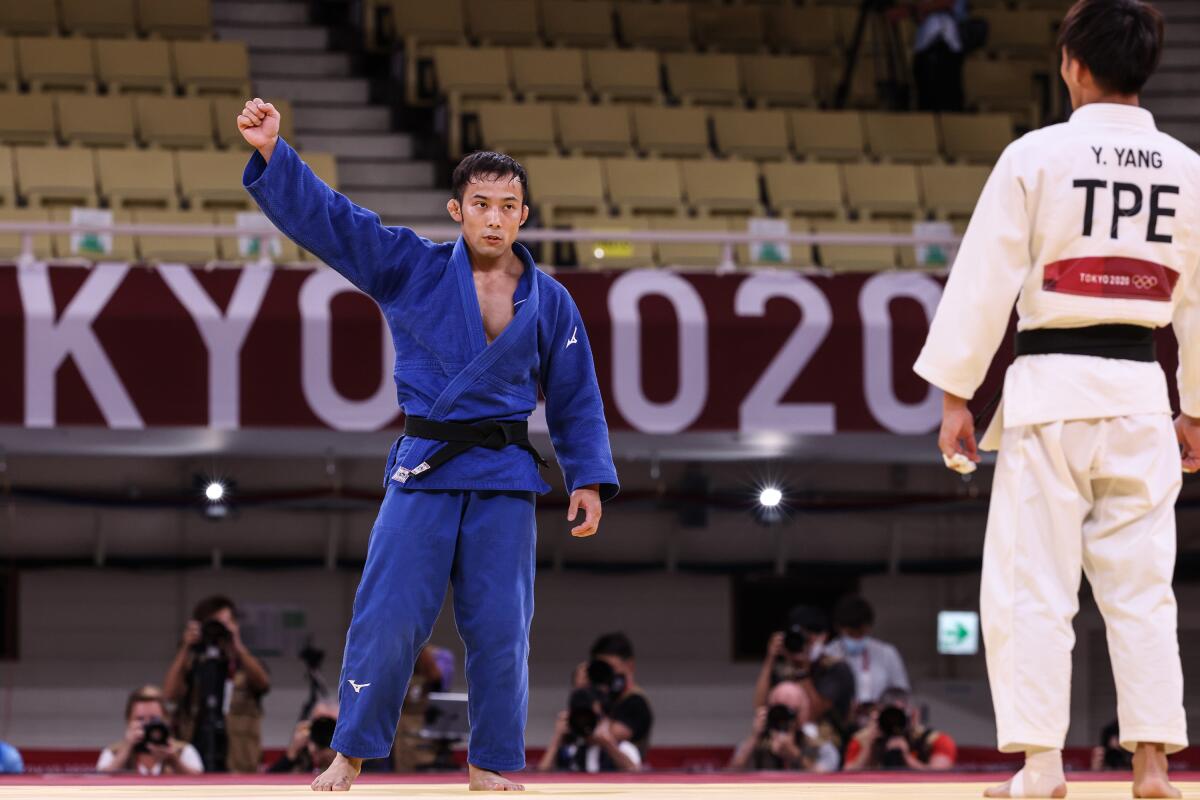Japan wins its first gold of the Games in judo on hallowed ground

- Share via
TOKYO — The moment, the revered location and the timing did not escape Naohisa Takato.
The Tokyo Olympic Games were delayed a year because of the COVID-19 pandemic, and they are mired in controversy in Japan.
But Takato on Saturday no doubt excited teammates — and might have begun lifting at least some Olympic spirits across the country — by winning the gold medal in the men’s judo lightweight division (132 pounds) at the historic Nippon Budokan. It marked the first gold medal won by a Japanese athlete in these Games.
“I’m very happy that I can inspire the national team of Japan by me winning the gold first,” Takato said through an interpreter during a news conference.
Takato defeated Taiwan’s Yung Wei Yang in the golden score after a match-deciding penalty for a victory that was achieved in the same building where judo was introduced as an Olympic sport in 1964.
Takato’s win came less than an hour after Funa Tonaki of Japan won the silver medal in the women’s extra-lightweight division (106 pounds). Distria Krasniqi of Kosovo defeated Tonaki to win the gold medal.
Japan’s medal run could continue Sunday. Uta Abe, the reigning world champion in the women’s half-lightweight (115 pounds) division, and her brother Hifumi, a men’s half-lightweight (146 pounds), are regarded as gold-medal contenders.
As the tournament progresses, Japan also will feature Shohei Ono, a 2016 Olympic gold medalist regarded as perhaps the best pound-for-pound judoka in the sport.
Judo, a martial art that was created in Japan, was expected to attract some of the most enthusiastic crowds of the Games. But because of the pandemic — parts of Japan are in a state of emergency — no spectators were on hand to see Takato win Japan’s 40th Olympic gold medal in judo.
The lack of cheering did not seem to bother Takato. Not after fulfilling his dream in such a hallowed venue. Takato, 28, said he knelt in the building to pay tribute to its legacy.
“I have been longing for winning in this historic building since my childhood,” he said.
The victory was redemption for Takato.
After winning the bronze medal at the Rio Games in 2016, he was anything but pleased by the result. Time only made it worse.
“Yes, indeed, I was angry,” he said. “Actually, well, I was mortified. That was the feeling that that I had in Rio. Therefore, for the past five years, since the Rio Games … I have been concentrating on my training so that I could make amends.”
Takato spent the last five years increasing his training while fixated on winning the gold medal. He became mentally stronger.
“The more I train,” he said, “the stronger feeling that I have.”
Takato and Tonaki are part of Japanese judo teams that include several other gold medal contenders. All will be performing under enormous pressure in the country that is the birthplace of the sport.
Takato, though, said he “wasn’t nervous at all” because of his preparation.
Despite Takato’s victory, Japan’s first gold medal might not spur greater public support for an overwhelmingly unpopular Olympics.
The U.S. women answer their wake-up call with a resounding 6-1 victory over New Zealand and are now 1-1 in soccer group play at the Tokyo Olympics.
As Takato won his final match, Tokyo residents enjoying their extended weekend at LaQua mall — located across the road from the Kodokan Judo Institute, which was opened by Jiguro Kano, judo’s founder — appeared unfazed by the news.
Hijiri Nagano, a 31-year old engineer, did not know about Takato’s victory.
“People don’t really speak about the Olympics,” Nagano said. “Nobody at work really does and I don’t discuss it with my friends.”
Takato defeated Jori Verstraeten of Belgium in the opening round and Lukhumi Chkhvimiani of Georgia in the quarterfinals. In the semifinals against Teldos Smetov of Kazakhstan, he won seven minutes into golden score, essentially an overtime period during which the first judoka to score wins.
In the final, the match once again went to golden score with Takato winning at the 3:40 mark.
Tonaki advanced to the women’s final by defeating Eva Csernoviczki of Hungary in her first match and then 2016 gold medalist Paula Pareto of Argentina in the quarterfinals. In the semifinals, against Daria Bilodid of Ukraine, she won three minutes into golden score.
But in the final, Krasniqi scored in the final seconds to end Tonaki’s bid for gold.
“The Olympic stage in Japan gave me a very special feeling, especially when I tried not to get too nervous,” Tonaki said through an interpreter. “I like to be myself and I think I was able to do that.”
Times correspondent Hanako Lowry contributed to this report.
More to Read
Go beyond the scoreboard
Get the latest on L.A.'s teams in the daily Sports Report newsletter.
You may occasionally receive promotional content from the Los Angeles Times.









